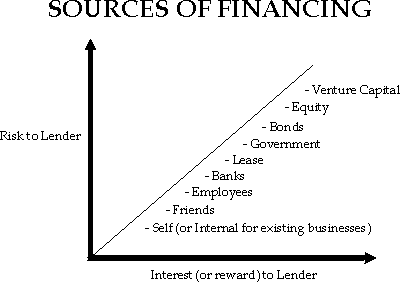| | It takes money to start a business. Determine the most suitable type of financing, as well as sources of various types of financing. This page includes tips on presenting a loan request - how to prepare statements, how to analyze profitability, using benchmark ratios to assess your business - as well as financing 'tools', consulting help available, a financial glossary and other sources of financial information.
Points to consider in raising capital | Financial tools to help analyze your business | Presenting your loan request | Sources of financing | Financial consulting services | Financial glossaries | Other links
Points to Consider in Raising Capital
"Preparation for outside financing must always start far in advance of the actual need."
Jeffrey P. Davidson 'Avoiding the Pitfalls of Starting Your Own Business'
Five important questions:
Your ability to offer a detailed, credible business plan is of prime importance when seeking a loan. Your finance proposal should be succinct and focus on the following key questions:
- How much do you want?
- How long do you want the money for?
- What are you going to do with the money?
- How are you going to repay the money?
- What are the alternative sources of repayment in the event of something going wrong?
When you make your make your initial presentation to a financial institution, or potential investor, GET TO THE POINT! Answer the foregoing five questions and you will have created a favourable first impression.
Ten key pointers in making an approach for financing:
- Analyze program thoroughly and completely.
- Identify positive and negative features.
- Communicate your ability to repay, a factor often more important than security.
- Involve client and or management in all details of presentation.
- Allow for contingencies.
- Provide investors/lenders adequate time for investigation.
- Be candid about all sources being canvassed.
- Make initial approaches to most senior personnel.
- Present a complete Business Plan, appropriate to the amount and type of financing required.
- Use pictures to create an impression.
Financial Tools to Help Analyze Your Business
Loan Calculators
Royal Bank
Financial projections software
Pro-Forma Plus, PendockMallorn Ltd
Start up cost sheet
Presenting Your Loan Request
Preparing and presenting a loan proposal
Online Women's Business Centre, U.S. Small Business Administration
- Approaching a lender
- What the lenders need to know?
- What do you need to know?
Major reasons lenders reject small business loan applications:
- too much debt
- too little equity
- lack of collateral
- inability to demonstrate repayment
- inadequate financial information
Major problems lenders encounter in dealing with small business:
- too little equity
- inadequate records
- incapable management
- inadequate financial knowledge
Characteristics of an ideal small business borrower:
- adequate equity
- experienced management
- sound financial practices
- timely well prepared business plan (including financials)
- positive profit history
In addition to the quantity of dollars secured, the following additional factors should be considered:
- raising the correct type of funding for the specific requirements;
- the lowest net cost for the funds, including front-end costs as well as interest and bonus arrangements;
- a manageable cash flow, related to the specific needs of the business;
- flexibility in refinancing and paying out financing as requirements change;
- undertaking covenants; both positive and negative, to be able to raise new funds at a later date;
- terms and conditions that are flexible and workable;
- funds raised on a timely basis, as required, and certainly with due anticipation of needs;
- an efficient and timely disbursement of financing proceeds;
- establishment of open and effective relationship with new finances and new "partners" of the business
Sources of Financing
Risk influences by type of lender/investor
Risk influences the type of lender/investor, the type and amount of security coverage, and the form of the financial instruments. The desired reward influences the rate of interest or return, and the type and form of the documents and finance instruments to ensure that the reward is achieved. Uncertainty of economic policy, financial markets, and local and global events and conditions can have an impact on the probability of success of an enterprise and the probability of a desired return being achieved. Accordingly, the time horizon of funding influences the inherent risk, and similarity the type and sources of financing available for various terms.

Methods of corporate financing
The following chart illustrates various methods of corporate finance in relation to different time frames for the funding.
Financing Your Business
The fact is, there are many sources and types of financing for your small business. The Canadian Business website can provide you with information on the various possibilities.
Government of Alberta
Agriculture Financial Services Corporation
Alberta Treasury Branches
Government of Canada
Farm Credit Canada
Business Development Bank
Export Development Canada
Banks and credit unions
BMO Financial Group
Canadian Imperial Bank of Commerce (CIBC)
Royal Bank
Scotiabank
Toronto Dominion Bank
RoyNat
Venture Capital
AVAC Ltd.
Other
Alberta Women Entrepreneurs (AWE)
Agriculture & Food Council
Services
Financial Consulting Services
Business Development Bank
KPMG
Grant Thornton
Financial Glossaries
FinancialGlossary.com
Financial Glossary
Glossary of Financial Terms
Financing - Other Links
Steps to growth capital
This document series is done in co-operation with
 |
|